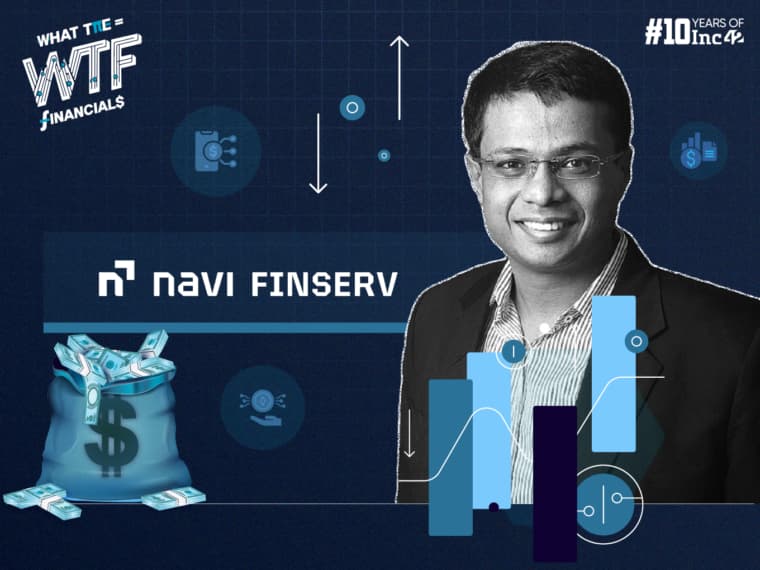
Navi Finserv posted operating revenue stood of INR 1,906.2 Cr in FY24 as against INR 2,040.6 Cr in FY23. However, the numbers are not comparable as the FY23 numbers also included income from Navi Finserv’s former subsidiary Chaitanya India Fin Credit Private Limited.
Excluding the revenue of Chaitanya India in FY23, Navi Finserv’s operating revenue rose about 48% from INR 1,283 Cr
Following the sale of the subsidiary, the consolidated PAT from continued operations slipped 56% YoY to INR 115.6 Cr in FY24
Update | October 12, 08:20 PM: The headline and the article have been edited to clearly explain the impact of sale of Navi Finserv’s former subsidiary Chaitanya India Fin Credit Private Limited.
Flipkart cofounder Sachin Bansal-led fintech startup Navi Technologies’ subsidiary Navi Finserv’s consolidated operating revenue stood at INR 1,906.2 Cr in the financial year 2023-24 (FY24) as against INR 2,040.6 Cr in FY23.
However, the numbers are not comparable as the FY23 numbers also included income from Navi Finserv’s former subsidiary Chaitanya India Fin Credit Private Limited. The startup divested its entire stake in the subsidiary during FY24.
Excluding the revenue of Chaitanya India in FY23, Navi Finserv’s operating revenue rose about 48% from INR 1,283 Cr.
Meanwhile, following the sale of the subsidiary, the consolidated profit after tax (PAT) from continued operations slipped 56% year-on-year (YoY) to INR 115.6 Cr in FY24.
The profit from discontinued operations stood at INR 429.5 Cr.
Including the profit of Chaitanya, the startup’s total consolidated net profit also more than doubled to INR 545.1 Cr in FY24 from INR 264.2 Cr in the previous year.
In August 2023, Ananya Birla-led Svatantra Microfin Pvt Ltd signed a definitive agreement to acquire Chaitanya for INR 1,479 Cr and completed the acquisition in November 2023.
Earlier, Bansal acquired Chaitanya Rural Intermediation Development Services (CRIDS) via BAC Acquisitions (now Navi Technologies) in 2019. CRIDS was later rebranded as Chaitanya India Fin Credit. The acquisition helped Navi acquire an NBFC licence. However, the Reserve Bank of India (RBI) rejected Chaitanya India Fin Credit’s application for an ‘on tap’ universal banking licence in 2022.
Navi Finserv was incorporated in 2012 and provides various kinds of loans, including personal, vehicle, and home loans. A majority of its revenue comes from interest income on loans, investments, and deposits with banks.
On a standalone basis, the startup’s total interest income grew nearly 36% to INR 1,611.1 Cr from INR 1,180.8 Cr in FY23. Its net gain on derecognition of financial instruments under amortised cost category almost doubled to INR 102.4 Cr during the year under review from INR 51.7 Cr in the previous year.
Navi Finserv’s total asset under management (AUM) stood at INR 8,527.2 Cr in FY24 growing from INR 6,791 Cr at the end of FY23. The startup also had total loan disbursements worth INR 16,006 Cr in FY24 as against INR 12,630 Cr the year before.
Zooming Into Expenses
Though not comparable, Navi Finserv’s total expenses saw a marginal increase to INR 1,750.4 Cr in the reported year from INR 1,743.9 Cr in FY23, with finance cost alone comprising over 37% of its total spending.
Finance Cost: The startup’s finance cost declined about 5% to INR 657.7 Cr in FY24 from INR 691.6 Cr in the year before.
Employee Cost: Navi Finsev cut its employee benefit expenses by a massive 42% to INR 149.9 Cr in FY24 from INR 257.9 Cr in the year before.
It spent INR 120.3 Cr on salaries, wages and bonuses in the year under review as against INR 217.1 Cr the previous year.
The decline could be attributed to the sale of Chaitanya. On a standalone basis, expenses under this bucket increased 77% YoY to INR 149.9 Cr in FY24.
Loans Written Off: The company’s spending on loan write-offs jumped to INR 406.2 Cr in FY24 from INR 125.4 Cr in the year before on a consolidated basis.
On a standalone basis, the loans written off saw a bigger jump of 275% YoY.
Overall, its impairment on financial instruments stood at INR 495.6 Cr in FY24.
“Our AUM growth scaled up in the last two quarters of FY23 leading to passover of P&L impact in FY 24. At the overall level, our credit costs for FY24 is at 6.7% of average quarterly AUM as compared to 7% of average quarterly AUM for FY23. Provision coverage ratio for FY24 stands at about 88% vis-a-vis about 83% for FY23,” said Navi Finserv in a statement.
Software Support Charges: Navi Finserv’s spending under this head grew over 50% YoY to INR 248.2 Cr in FY24.
Navi Finserv converted into a public entity in March 2022. Its holding company Navi Technologies
In July this year, Navi Finserv did a final close of a $38 Mn personal loans securitisation deal with JP Morgan.
Earlier this year, the company also raised INR 150 Cr via bond issuance from several investors, including Dadachanji Group chairman Kairus Shavak Dadachanji, Pervin Kairus Dadachanji, and Rishad Kairus Dadachanji.































 Ad-lite browsing experience
Ad-lite browsing experience